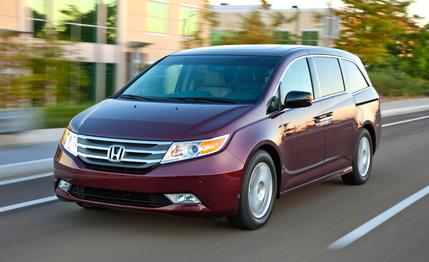
 First Drive Review
First Drive Review
When redesigning a vehicle that doesn’t need much improvement, engineers have extra time on their hands. Case in point: The Odyssey’s interior team spent some of theirs measuring 800 purses, ensuring that 80 percent of women’s (and some men’s) carryalls would fit in a new removable bin between the front seats.
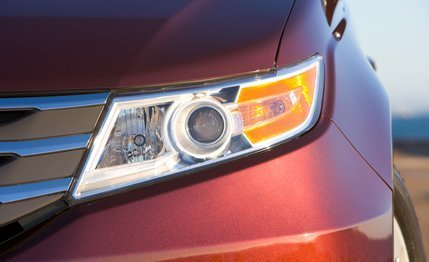

Before they could tackle the cabin, though, a little exterior shape shifting was required, just for the sake of freshness. The wheelbase is unchanged, but the van is almost an inch longer overall, more than two inches wider, and lower by about half an inch. Roof rails are no longer included from the factory, which helps reduce visual height even more. (Roof rails and crossbars are now available exclusively from the dealer; we were told that only a small percentage of previous-gen Odyssey buyers opted for the bars.) The sleek, updated design is dominated by a “lightning bolt” character line intended to make the Odyssey recognizable from afar while lowering the glass to improve the view for third-row passengers. That assumes they can be persuaded to avert their gaze from the newly available, 16.2-inch widescreen video display. Road-trip time-passing mainstays I Spy and Geography are all but officially obsolete.
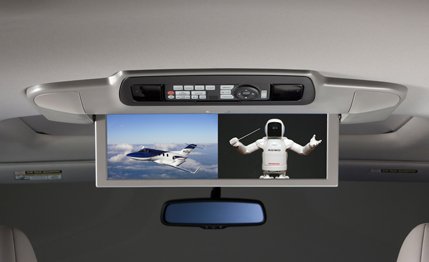

Although the van is larger overall, Honda managed to reduce weight through the use of more high-strength steel and by trimming poundage wherever possible. Mass is down by a claimed 50 to 100 pounds, depending on trim. Despite having less mass to stop, the brake discs are larger by almost an inch all around. The pedal is firmer, too, and offers more feedback compared with that of the already good 2010 Odyssey.
Considerable chassis-stiffness improvements, as well as track increases, led to retuned front and rear independent suspensions that now use bypass-valve-equipped dampers to better soak up harsh impacts. The ride is as comfortable and poised as before, with body roll remaining minimal for a minivan. A new variable-displacement power-steering pump reduces effort slightly, but a bit of steering feel has been lost along with it; the average minivan buyer likely won’t mind, and the Odyssey remains the driver’s choice in the segment. (You may recall that the outgoing model won our most recent minivan comparo.)
Honda’s cylinder-deactivating, 3.5-liter V-6 is now standard across the lineup, with output up 4 hp and 5 lb-ft of torque, thanks to a two-stage intake and reduced internal and accessory losses. Apparently not content with offering a single powertrain for all Odysseys, Honda has introduced an additional forward gear ratio—for a total of six—for the Touring and new top-spec Touring Elite. The six-speed’s wider spread helps wring a bit more out of the engine and, along with some Touring-specific aerodynamic massagery, grants the models a 1-mpg advantage in EPA ratings over the five-speed-equipped LX and EX models. All 2011 Odysseys gain a pretty notable 2-to-4 mpg in EPA city and highway figures.
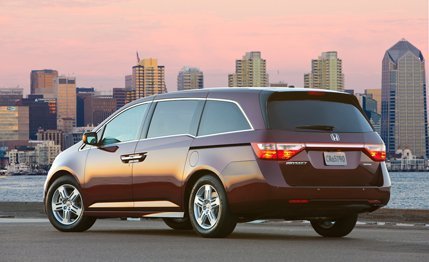

The interior, though, is where the magic happens in minivans. (Or is its necessity the result of magic already happening?) This interior, unlike those of previous Odysseys, has been designed by Americans for Americans. The dash layout is cleaner, simpler, and more symmetrical, and the gear selector has been moved down slightly. Thoughtful touches include the aforementioned removable center console—its deployable trash-bag ring provides a destination for empties from the 15 bottle and cup holders—and a cooling box at the base of the center stack.
The second row’s center seat is four inches wider and can be slid toward the front seats for more meaningful parent-child interaction. Folding the center section is less of a hassle, as this operation no longer requires the removal of the seat-bottom cushion, and there also are three cup holders in the seatback-as-armrest that result. Meanwhile, the outboard chairs can be repositioned doorward to initiate “wide mode,” allowing for three-across American adults or a trio of kid seats. (The Odyssey is the first minivan to offer as many as five LATCH positions for car seats.) Assuming no kiddie chairs are in the way, passage to the rearmost bench has been widened by an inch. An easier-to-operate Magic Seat mechanism makes stowing either side of the 60/40 split third row a one-yank operation.
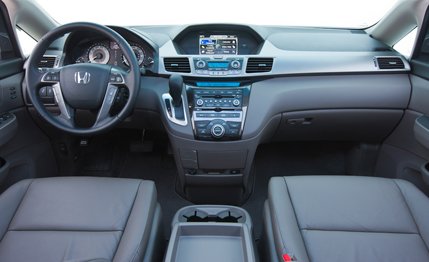

Honda has adjusted the trim-level offerings for 2011 as well, killing the EX-L model with navigation and rear entertainment and adding the Touring Elite model at the top of the range. Base LX models ($28,580) do without the new front center console and instead pack a pair of floor-mounted cup holders; they also lack the second-row center seat and therefore seat only seven. Moving to the $31,730 EX brings the console and the eighth seat; it also features power sliding doors and power lumbar for the driver’s seat. The EX-L adds leather, the cooling box, a USB audio interface, and Bluetooth and costs $35,230. There’s still an EX-L with rear entertainment ($36,830) and one with navigation and a rearview camera ($37,230). But to know where you’re going while being able to entertain the kids in back, it’s necessary to move up to the $41,535 Touring model, which includes the six-speed transmission, parking sensors, a center armrest for the third row, and third-row sunshades. The top-spec Touring Elite—or what we like to think of as the Acura of minivans—adds a 12-speaker, 5.1-channel surround-sound system; the 16.2-inch widescreen rear monitor (it can display two inputs side by side); an HDMI input; HID headlights; and a blind-spot monitoring system—all for $44,030. As to availability, you’ll be able to buy the 2011 Odyssey of your dreams at the end of September.
Even with all the improvements, the stickers for carry-over trims stay close to 2010 levels, although the all-new Elite extends the price range upward. A full 100 percent of purse carriers should be happy with that.